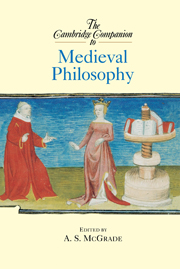Book contents
- Frontmatter
- Introduction
- 1 Medieval philosophy in context
- 2 Two medieval ideas: eternity and hierarchy
- 3 Language and logic
- 4 Philosophy in Islam
- 5 Jewish philosophy
- 6 Metaphysics: God and being
- 7 Creation and nature
- 8 Natures: the problem of universals
- 9 Human nature
- 10 The moral life
- 11 Ultimate goods: happiness, friendship, and bliss
- 12 Political philosophy
- 13 Medieval philosophy in later thought
- 14 Transmission and translation
- Chronology of philosophers and major events
- Biographies of Major Medieval Philosophers
- Bibliography
- Index
5 - Jewish philosophy
Published online by Cambridge University Press: 28 May 2006
- Frontmatter
- Introduction
- 1 Medieval philosophy in context
- 2 Two medieval ideas: eternity and hierarchy
- 3 Language and logic
- 4 Philosophy in Islam
- 5 Jewish philosophy
- 6 Metaphysics: God and being
- 7 Creation and nature
- 8 Natures: the problem of universals
- 9 Human nature
- 10 The moral life
- 11 Ultimate goods: happiness, friendship, and bliss
- 12 Political philosophy
- 13 Medieval philosophy in later thought
- 14 Transmission and translation
- Chronology of philosophers and major events
- Biographies of Major Medieval Philosophers
- Bibliography
- Index
Summary
If medieval philosophy is strange to the modern reader, medieval Jewish philosophy is even stranger. To the extent that medieval philosophy has been recognized as philosophy rather than dismissed as theology, its boundaries have been strictly drawn, geographically and doctrinally, around Christian western Europe. This excludes both Islamic and Jewish philosophy, so that even significant philosophical activity in southern France and Islamic Spain has remained invisible to the modern western tradition. When activity beyond the prescribed boundaries has been acknowledged at all, it has been by the few historians of medieval philosophy and then, as a rule, only to the extent that its influence on major Christian thinkers could not be ignored. The significance of work beyond the boundaries has thus been determined almost exclusively by relevance to the interests of Christian philosophers. Except for a few specialists, therefore, the general view of medieval philosophy remains unduly narrow. Whether one reads Hegel’s lectures on the history of philosophy, or Heidegger’s, or Russell’s, one could only conclude that there were no medieval Jewish philosophers – and this despite the fact that the period in question is esteemed by scholarly Jews as a golden age.
- Type
- Chapter
- Information
- The Cambridge Companion to Medieval Philosophy , pp. 121 - 146Publisher: Cambridge University PressPrint publication year: 2003
- 2
- Cited by



